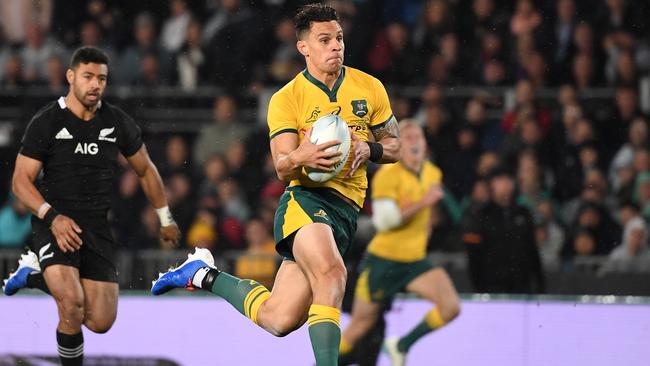Summer rugby Tests could be the future
Australian rugby is set to get “clear air” from the rival AFL and NRL codes if World Rugby moves to a global calendar in time for the 2021 season.

Australian rugby is set to get clear air from the rival AFL and NRL codes at the start of the year if, as now looks increasingly likely, World Rugby moves to a global calendar for the 2021 season.
World Rugby has had a working group exploring a global season since the start of the COVID-19 crisis but it was only when one of the members of that group, South African Rugby chief executive Jurie Roux, broke cover in a media conference with South African journalists earlier this week that it became evident just how close the game is to finally bringing the southern and northern hemispheres into alignment.
“It will probably be decided by July 1, so that everybody can start doing their planning,” Roux said.
His Rugby Australia counterpart Rob Clarke indulged the possibility that it could all be done by the start of next month but clearly he believes it could take considerably longer.
“I’m glad Jurie’s optimistic and for all of our sakes it would be great if that was the case. Time will tell,” Clarke said.
But even allowing for some caution regarding the timing, Clarke was upbeat about the concept. “I can potentially see the advantages but ultimately the devil is in the detail around the commercial pay-off of a significant change like this. You would only do it if there was significant upside.
“That being said, if we were to kick off the year with a Test match program, let’s call it the TRC, then it certainly puts rugby on the map at the beginning of the year. It allows for us to have a cleaner window pre-NRL and AFL seasons getting into full swing.
“People talk about having a tent pole at each end to hold up the tent. Well, if you had a tent pole of the Rugby Championship at the beginning of the year and a tent pole of the north coming south and south going north in October-November and in between you have your Super Rugby competitions and your club rugby then it starts to take nice shape.”
It might seem an odd way to start the year, with Bledisloe Cup Tests against the All Blacks as part of the Rugby Championship, but it will only seem strange if Australia continue to view each rugby season as a distinct year. Instead, it would make more sense to think of each season in cricket terms.
Hence, the 2021-22 campaign would begin in logical sequence with Super Rugby – or whatever its equivalent is – in April, going through to around September, followed by the inbound Tests in October when, say, England, Wales and Italy would head south to play one Test each against the southern hemisphere giants.
In November, the Wallabies, All Blacks, Springboks and Pumas would head north for their customary spring tour matches against Scotland, Ireland and France. They would then break for Christmas but would return to training in January before concluding their international program with Rugby Championship.
“And if it helps us to align with the Six Nations tournament, you might be able to get a championship game between the champion of the north versus the champion of the south. ” Clarke said.
World Rugby executive committee member Brett Robinson says Australians might take some time adjusting to long-established seasons becoming intertwined.
“I guess maybe we have to challenge ourselves but the way our minds work is that you get through cricket, you see a bit of rugby in February-March and by the time cricket finishes, you’re well into your footy and by the time the cool months come around the Test football starts,” Robinson said. “But if it works and it allows us to drive the commercial outcomes and what does it mean for our domestic market and our club comp and the community game as well.”
Had it not been for the COVID-19 pandemic, Robinson is convinced none of this would have been possible. The pandemic breathed life back into the Nations Championship, the World Rugby supported concept intended to make every Test part of a larger competition but one which seemingly was killed off by the greed of the Six Nations countries which refused to even consider the concept of promotion and relegation. Instead, they went their separate way – with private equity.
Australia might be forced to consider private equity as it looks for the capital to exploit the new opportunities on the calendar.
“I think we need to be open-minded to all form of financial support and explore all relevant avenues,” said Clarke. “With so much up in the air and so much change and the ability to make change for the first time in a long time, then we need to canvass all opportunities — be it competition structures, be it funding and everything in between.”







To join the conversation, please log in. Don't have an account? Register
Join the conversation, you are commenting as Logout